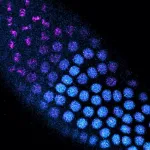(Press-News.org) Non-alcoholic fatty liver, NAFLD, is associated with several health risks. According to a new registry study led by researchers at Karolinska Institutet in Sweden, NAFLD is linked to a 17-fold increased risk of liver cancer. The findings, published in Hepatology, underscore the need for improved follow-up of NAFLD patients with the goal of reducing the risk of cancer.
"In this study with detailed liver histology data, we were able to quantify the increased risk of cancer associated with NAFLD, particularly hepatocellular carcinoma," says first author, Tracey G. Simon, researcher at the Department of Medical Epidemiology and Biostatistics, Karolinska Institutet, and hepatologist at Massachusetts General Hospital and Harvard Medical School. "We also found that all stages of NAFLD were associated with excess cancer risk, even early stages of the disease."
Non-alcoholic fatty liver disease (NAFLD) is the most common cause of chronic liver disease in Europe and the United States, affecting more than 100 million adults. A large proportion of patients progress to nonalcoholic steatohepatitis (NASH) with fibrosis, which in turn can lead to cirrhosis.
There is relatively little research on cancer development with NAFLD, and prior research has some limitations that make it difficult to draw far-reaching conclusions. Hence, there is a need for more information on links between cancer risk and NAFLD, and for improved monitoring strategies for high-risk patients with NAFLD.
In this study, researchers at Karolinska Institutet, in collaboration with researchers at Harvard University and Columbia University, examined the risk of cancer in people with NAFLD. The registry study included 8,892 Swedish patients with biopsy-confirmed NAFLD and 39,907 healthy controls.
Data on cancer were retrieved through the nationwide Swedish Cancer Register. Patients with NAFLD were identified through the ESPRESSO (Epidemiology Strengthened by Histopathology Reports in Sweden) cohort.
Individuals with NAFLD were at a 27 percent increased risk of any cancer. This risk was to a large extent driven by the 17-fold increased risk of hepatocellular carcinoma (HCC). Furthermore, NAFLD was associated with modestly increased rates of pancreatic cancer, kidney/bladder cancer, and melanoma, but no other cancers.
"These findings should be used to develop more targeted interventions designed to reduce cancer risk in patients with NAFLD," says corresponding author Jonas F. Ludvigsson, pediatrician at Örebro University Hospital and professor at the Department of Medical Epidemiology and Biostatistics, Karolinska Institutet. "They also highlight the need for more personalized strategies to screen for HCC in certain high-risk patients, such as those with NAFLD fibrosis and type 2 diabetes."
INFORMATION:
This project was supported by grants from NIH, Harvard University, Region Stockholm, Crohn's and Colitis Foundation and Karolinska Institutet.
Jonas F. Ludvigsson coordinates a study on behalf of the Swedish IBD quality register (SWIBREG). That study has received funding from the Janssen corporation. Tracy G. Simon has previously served as a consultant to Aetion, for work unrelated to this project. Hannes Hagström's department has received research grants from AstraZeneca, Intercept and Gilead, and he has been an advisory board member of Bristol Myers Squibb and Gilead.
Publication: "Cancer Risk in Patients With Biopsy?Confirmed Nonalcoholic Fatty Liver Disease: A Population?Based Cohort Study". Tracey G. Simon, Bjorn Roelstraete, Rajani Sharma, Hamed Khalili, Hannes Hagström, Jonas F. Ludvigsson. Hepatology, online April 3, 2021, doi: 10.1002/hep.31845.
An outbreak of vomiting among dogs has been traced back to a type of animal coronavirus by researchers.
Vets across the country began reporting cases of acute onset prolific vomiting in 2019/20.
The Small Animal Veterinary Surveillance Network (SAVSNet) at the University of Liverpool asked vets for help in collecting data, with 1,258 case questionnaires from vets and owners plus 95 clinical samples from 71 animals.
Based on this data, a team from the universities of Liverpool, Lancaster, Manchester and Bristol identified the outbreak as most likely to ...
ITHACA, N.Y. - Women's increased agricultural labor during harvest season, in addition to domestic house care, often comes at the cost of their health, according to new research from the Tata-Cornell Institute for Agriculture and Nutrition (TCI).
Programs aimed at improving nutritional outcomes in rural India should account for the tradeoffs that women experience when their agricultural work increases, according to the study, "Seasonal time trade-offs and nutrition outcomes for women in agriculture: Evidence from rural India," which published in the journal Food Policy on March ...
PHILADELPHIA-- Humans have a uniquely high density of sweat glands embedded in their skin--10 times the density of chimpanzees and macaques. Now, researchers at Penn Medicine have discovered how this distinctive, hyper-cooling trait evolved in the human genome. In a study published today in the Proceedings of the National Academy of Sciences of the USA, researchers showed that the higher density of sweat glands in humans is due, to a great extent, to accumulated changes in a regulatory region of DNA--called an enhancer region--that drives the expression of a sweat gland-building gene, explaining why humans are the sweatiest ...
PHOENIX, Ariz. -- April 13, 2021 -- Findings of a study by the Translational Genomics Research Institute (TGen), an affiliate of City of Hope, suggest that increasing expression of a gene known as ABCC1 could not only reduce the deposition of a hard plaque in the brain that leads to Alzheimer's disease, but might also prevent or delay this memory-robbing disease from developing.
ABCC1, also known as MRP1, has previously been shown in laboratory models to remove a plaque-forming protein known as amyloid beta (Abeta) from specialized endothelial cells that surround and protect ...
Compared to newborns conceived traditionally, newborns conceived through in vitro fertilization (IVF) are more likely to have certain chemical modifications to their DNA, according to a study by researchers at the National Institutes of Health. The changes involve DNA methylation--the binding of compounds known as methyl groups to DNA--which can alter gene activity. Only one of the modifications was seen by the time the children were 9 years old.
The study was conducted by Edwina Yeung, Ph.D., and colleagues in NIH's Eunice Kennedy Shriver National Institute of Child Health and Human ...
A team of UBC Okanagan researchers has determined that the type of fats a mother consumes while breastfeeding can have long-term implications on her infant's gut health.
Dr. Deanna Gibson, a biochemistry researcher, along with Dr. Sanjoy Ghosh, who studies the biochemical aspects of dietary fats, teamed up with chemistry and molecular biology researcher Dr. Wesley Zandberg. The team, who conducts research in the Irving K. Barber Faculty of Science, explored the role of feeding dietary fat to gestating rodents to determine the generational effects of fat exposure on their offspring.
"The goal was to investigate how maternal dietary habits can impact an offspring's gut microbial communities and their associated sugar molecule patterns ...
HANOVER, N.H. - April 14, 2021 - Scientists have searched for years to understand how cells measure their size. Cell size is critical. It's what regulates cell division in a growing organism. When the microscopic structures double in size, they divide. One cell turns into two. Two cells turn into four. The process repeats until an organism has enough cells. And then it stops. Or at least it is supposed to.
The complete chain of events that causes cell division to stop at the right time is what has confounded scientists. Beyond being a textbook problem, the question relates to serious medical challenges: ...
LOS ANGELES (April 13, 2021) -- The Lundquist Institute (TLI) Investigator Dong W. Chang, MD, and his colleagues' study on critically ill patients and ICU treatments was published in JAMA Internal Medicine. The study - "Evaluation of Time-Limited Trials Among Critically Ill Patients with Advanced Medical Illnesses and Reduction of Nonbeneficial ICU Treatments" - found that training physicians to communicate with family members of critically ill patients using a structured approach, which promotes shared decision-making, improved the quality of family meetings. This intervention was associated with reductions in invasive ICU treatments that prolonged suffering without benefit for patients and their families.
"Invasive ICU treatments are frequently delivered to patients ...
In April 2019, scientists released the first image of a black hole in galaxy M87 using the Event Horizon Telescope (EHT). However, that remarkable achievement was just the beginning of the science story to be told.
Data from 19 observatories released today promise to give unparalleled insight into this black hole and the system it powers, and to improve tests of Einstein's General Theory of Relativity.
"We knew that the first direct image of a black hole would be groundbreaking," says Kazuhiro Hada of the National Astronomical Observatory of Japan, a co-author of a new study published in The Astrophysical Journal Letters that ...
If global warming continues unchecked, summer monsoon rainfall in India will become stronger and more erratic. This is the central finding of an analysis by a team of German researchers that compared more than 30 state-of-the-art climate models from all around the world. The study predicts more extremely wet years in the future - with potentially grave consequences for more than one billion people's well-being, economy, food systems and agriculture.
"We have found robust evidence for an exponential dependence: For every degree Celsius of warming, monsoon rainfalls will likely increase by about 5%," says lead author Anja Katzenberger from the Potsdam-Institute ...




